Welcome to our deep dive into the enchanting world of Scottish Fold cats and their intriguing vocal habits. When you think of cats, you might imagine a soft purring or a demanding meow for food in the morning.
But does this imagery hold up for the adorable Scottish Fold breed? Scottish Fold cats are known for their distinctive folded ears, creating a unique, owl-like appearance that’s impossible to resist. However, when it comes to their vocal tendencies, do they express themselves as loudly as their appearances speak volumes? Let’s find out together if Scottish Fold noises are as notable as their looks.
These intriguing felines tend to have a more quiet and serene approach to communication. Unlike some of their feline counterparts who may not shy away from a loud conversation, Scottish Folds prefer a less vocal method to get their point across.
But does that mean they don’t have much to say? Absolutely not. Scottish Folds communicate in their own unique ways, and understanding their vocal nature offers a glimpse into their charming world.
In this blog, we’ll explore the fascinating world of Scottish Fold cat noises. From their calm meows to the soft purrs, we aim to uncover everything you need to know about how vocal these charming cats can be.
So, whether you’re a proud Scottish Fold parent or just a cat enthusiast, join us on this journey to decode the quiet yet expressive language of Scottish Fold cats. Let’s unravel the mystery together!
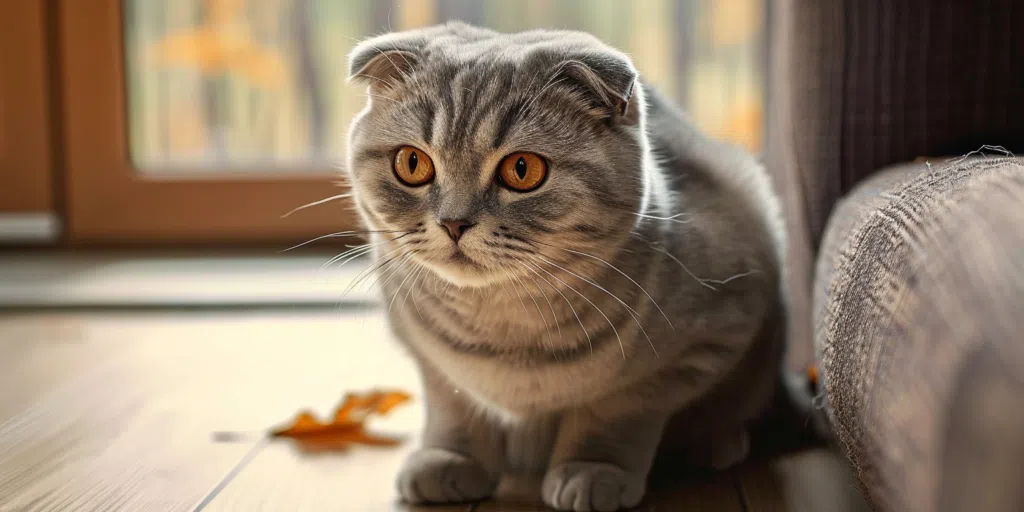
Are Scottish Fold Vocal Cats?
No, not much! When it comes to the Scottish Fold breed, their vocal cords don’t get quite the workout that some other breeds do. Particularly, male and female Scottish Folds may have differences in their noise level, but generally, the breed is known for being on the quieter side.
That said, individual personalities do come into play. While the breed as a whole might be seen as reserved, don’t be surprised if your Scottish Fold is an exception, choosing to vocalize more often, especially if they’re seeking your attention or about to engage in some playful activity.
Interestingly, Scottish Fold cats’ activity and exercise levels can also influence how vocal they are. Typically, a more active and playful Scottish Fold might be quieter, as they’re too busy engaging in physical activities.
On the other hand, a cat that’s more laid back might use their voice more regularly to communicate with their humans, especially if it’s near mealtime or they want some cuddles.
However, even the most talkative Scottish Fold would hardly be considered loud when compared to more vocal breeds.
Factors That Influence Scottish Fold Noise Levels
The quiet nature of Scottish Fold cats can be quite endearing to their owners. Their soft voices add to the gentle aura these cats carry.
Whether it’s a quiet meow to greet you when you come home or a soft purr as they snuggle up next to you, the sounds a Scottish Fold makes truly make your relationship with them special.
Their vocalizations, while not as frequent or loud, carry a lot of meanings, and learning to understand these subtle cues can significantly enhance the bond between you and your furry friend.
Their Age
Just like humans, Scottish Fold cats go through different life stages, each influencing their behavior and noise levels. Kittens are naturally more vocal. This is their way of communicating their needs, be it hunger, cold, or the desire for attention.
As Scottish Fold kittens grow older, you may notice a decrease in their vocalizations. Adult Scottish Folds are generally quieter and have learned other ways to communicate their needs to their humans.
Senior Scottish Fold cats, meanwhile, might become more vocal again, possibly due to health issues or confusion as they age.
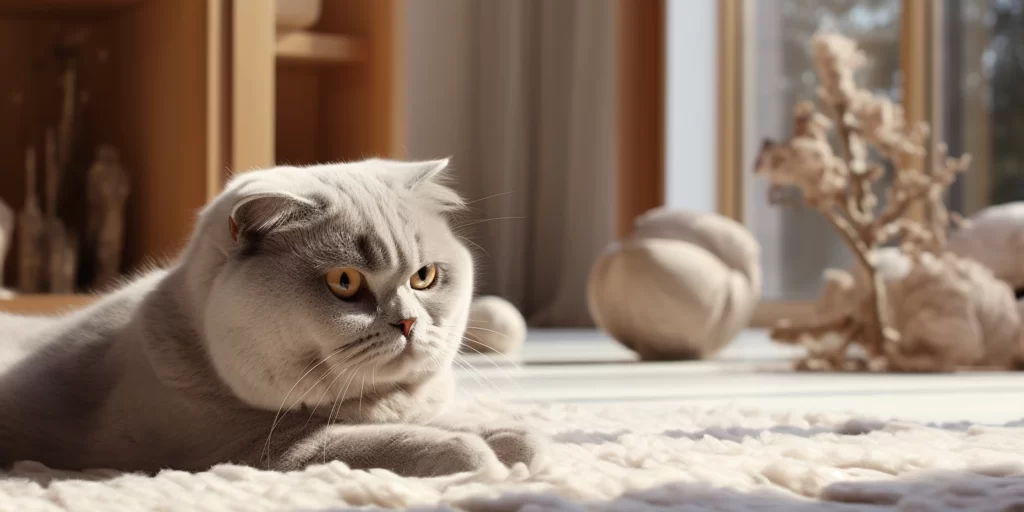
Feeding Scottish Fold and Its Relation to Noise Levels
Meal times are often when you’ll hear Scottish Fold cats vocalizing their needs. They might meow softly to remind you it’s time for food or purr contentedly once they see you preparing their meal. The way you respond to these cues can affect their vocal behavior.
For instance, if a Scottish Fold learns that meowing gets a quick response from their owner, they might use their voice more frequently around feeding times.
Understanding and responding appropriately to these vocalizations can help maintain a happy and healthy feeding routine for your Scottish Fold.
Scottish Fold Exercise Level affects Their Noise Levels
A Scottish Fold’s activity level plays a significant role in their vocal behavior. A well-exercised cat is generally a quiet cat. Ensuring your Scottish Fold has plenty of opportunities for play and exercise can help keep them engaged and content, reducing the need for vocal demands.
Toys, interactive play, and even simple daily routines can provide the stimulation your Scottish Fold needs to stay happy and relatively quiet.
Medical Conditions
It’s important to note that a sudden increase in vocalization can be a sign of distress or medical issues in Scottish Fold cats. If your typically quiet Scottish Fold starts to become more vocal without an apparent reason, it might be time for a vet visit.
Pain, discomfort, or underlying health problems can lead a cat to vocalize more than usual as a way of expressing that something is wrong.
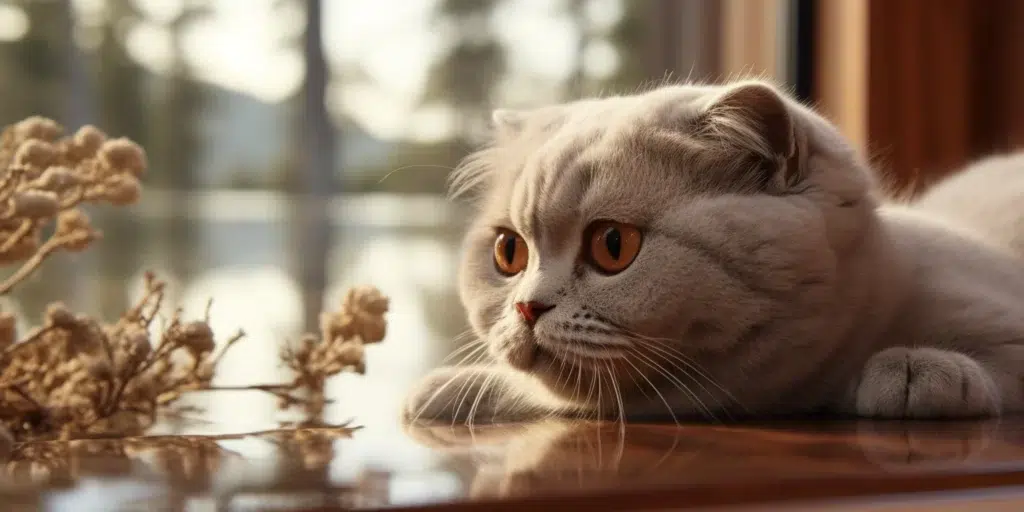
Scottish Fold Noises and Their Meaning
Understanding the different sounds your Scottish Fold makes is crucial in building a strong and loving relationship with them.
Every meow, purr, or hiss has its own meaning, and decoding these can help you better cater to your cat’s needs and desires.
Meow (The Most Common Noise)
The meow is a versatile sound in a Scottish Fold’s vocal repertoire but used sparingly. It can signify anything from a greeting, a request for food, or a simple “pay attention to me” call.
Observing the context in which your Scottish Fold meows will help you understand what they’re trying to communicate.
Purring (The Most Enjoyable Cat Noise)
Purring is often associated with contentment and happiness. A Scottish Fold that purrs while curled up in your lap is expressing their comfort and pleasure in being near you. However, it’s also worth noting that cats sometimes purr when they’re anxious or ill, so it’s essential to consider the context.
Hissing (Your Cat Feels In Danger)
Hissing is a clear sign of distress or feeling threatened. Scottish Folds are generally not aggressive cats, so a hiss could indicate that they’re uncomfortable with a situation or person. It’s a signal to back off and give them space.
Yowl (Not a Happy Meow)
Yowling is a longer, more drawn-out sound and can indicate loneliness, stress, or health issues. If your Scottish Fold yowls frequently, it might be seeking more attention or possibly signaling that it’s time for a vet check-up.
Growls (Not as Scary as a Tiger)
Growling can be a warning sign from your Scottish Fold that they’re not happy. Whether they’re annoyed with another pet or uncomfortable with a situation, it’s a signal that they want something to change.
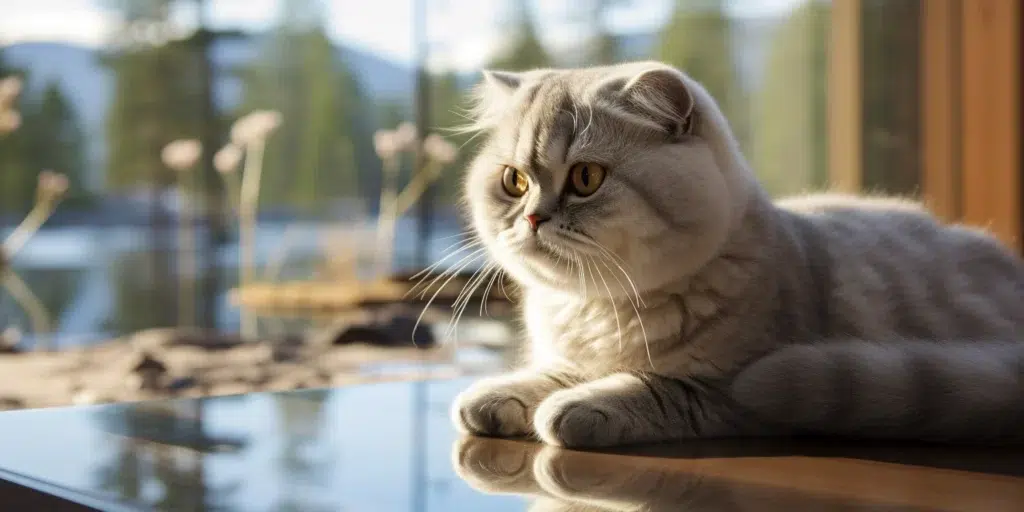
Some Cats are More Talkative Than Others
Generalizations about the Scottish Fold breed being quiet can have exceptions. Like people, every cat has its own unique personality. Some Scottish Folds may be more inclined to use their voice, while others maintain their stoic silence. Understanding and respecting these individual differences are key to a harmonious relationship with your pet.
How to make Scottish Fold less vocal?
If you find your Scottish Fold is more vocal than you’d expect, consider their environment and needs. Ensuring they have enough playtime, attention, and a comfortable space can help minimize excessive vocalizations.
It’s also important to establish and maintain a routine, as cats find comfort in predictability. Lastly, positive reinforcement for quiet behavior can also encourage a more peaceful atmosphere.
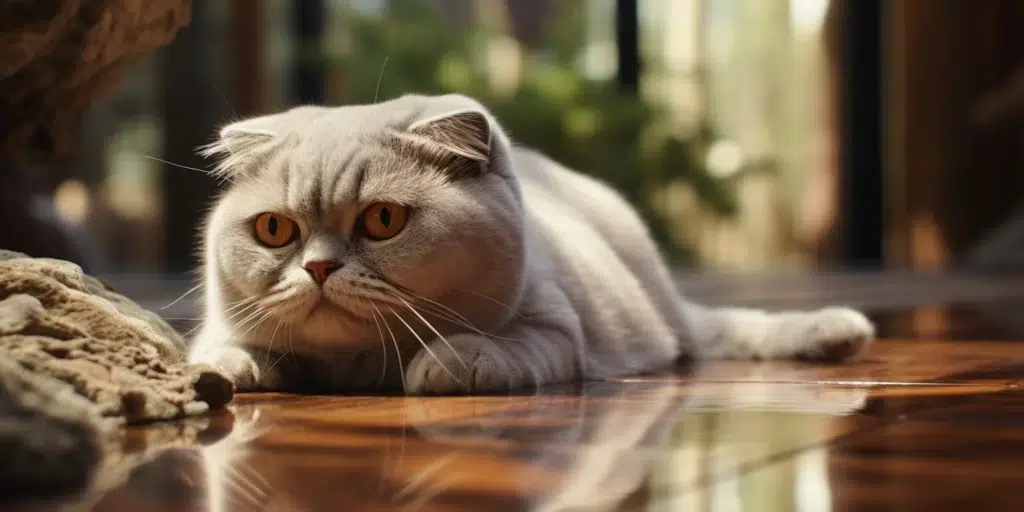
Conclusion
Scottish Fold cats may not be the most vocal breed out there, but they certainly know how to make their feelings known in their own unique and endearing ways. Understanding the nuances of their noises can deepen the bond between you and your furry friend.
Whether it’s the soft mews of greeting, the gentle purrs of contentment, or the less frequent hisses of discomfort, each sound tells a story of their inner world.
Learning to speak this language of love not only brings insight but also enriches the magical relationship shared with your Scottish Fold companion.